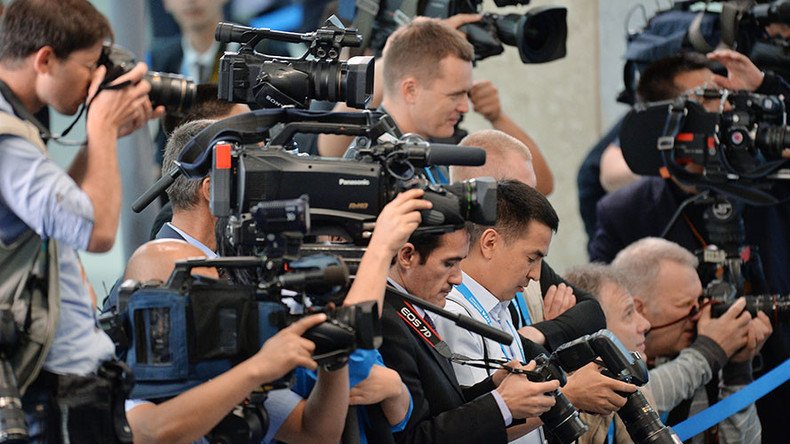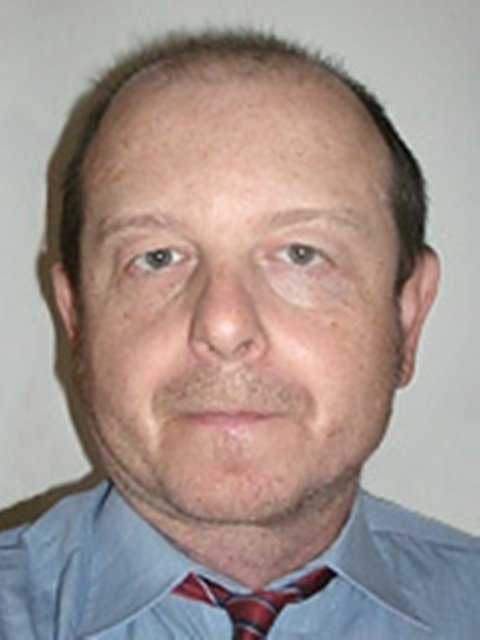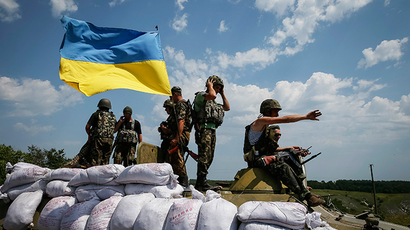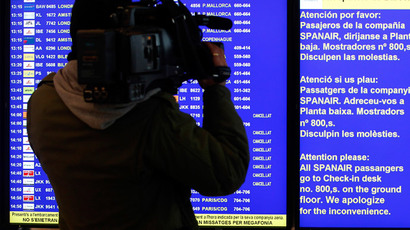Ukrainian govt crusade against journalism takes a new ugly turn

As the situation in Ukraine developed into a frozen/low intensity conflict, independent journalism is treated as the enemy and unfortunate collateral damage.
Human Rights Watch in New York is "very concerned about restrictions on freedom of expression and media freedoms in Ukraine, such as the banning of certain Russian journalists, films, books-measures such as these are disproportionate and show blatant disregard for freedom of expression."
Last year the Poroshenko administration issued its own enemy list that had over 400 names on it including over 30 international journalists banned from entering the country.
The government reversed its decision quickly due to enormous international pressure as the move smacked straight out of the totalitarian state playbook. However the apparent use of an unofficial journalist enemy list is still in effect as Polish journalist Tomasz Matejczuk found out when he was briefly detained at the Polish-Ukrainian border and given a five year ban stamp in his passport on April 29.
The detention of German journalist Saiidi Isakov followed his arrival at Odessa Airport on April 30 when he was refused entry into the country as well.
The issue of journalists punished for writing truth about the political situation in Ukraine and its accompanied state of corruption is as old as the history of Ukraine's independence since 1991. When looking at the still unsolved case of the killing of journalist Georgiy Gongadze in 2000 or the ongoing case of Polish journalist Aleksander Orlow it’s easy to see a pattern of legal persecution characteristic of totalitarian rule rather than the rule of law. Orlow has been imprisoned for five years in Odessa under trumped-up charges has now undergone over 150 hearings and still no verdict. That is despite witnesses against him recanting their testimony leaving him in some kind of legal limbo.
The Kiev revolution in 2014 that was supposed to end the centralized system of corruption has ushered in an even more aggressive and ruthless state that sees all journalists and writers as a two dimensional tool: one is either with or against it. Nothing illustrates this better than the political show trial masquerading as due process in the case of Ukrainian journalist and activist Ruslan Kotsaba.
Kotsaba was arrested on 7 February, 2015 in Ivano-Frankivsk, after he posted a video describing the conflict in the east as "fratricidal civil war” and condemned the Ukrainian political and oligarch class for benefiting from it. He also expressed opposition to military conscription of Ukrainians to take part in the conflict as it is against his conscience and urged others to follow suit.
"Ruslan has been involved in the EuroMaidan but when he understood it was a mistake financed with foreign money he asked me to support him when he wanted to go against the military mobilization," said Tetiana Montian, his attorney. "Of course I agreed but I also told him that he will sit in prison as long as Poroshenko stays president," she said. "He went to the east and saw that the whole conflict was about making money on the military budget in a civil war and not the Russian aggression as sold to the public. He spoke out against it and as result government had to silence him while the military hysteria is a business project for our establishment. This whole legal process is nothing as people in the court are just puppets. The real deciders here are Poroshenko and his chief of administration, Oleksiy Filatov," Montian concluded.
"They raided the house and took all of Ruslan's stuff including computer and all of our life savings. They left me with 500 hryvnia ($20) plus the change in the kid’s piggy banks to live on," said Uliana Kotsaba, Ruslan's wife. "Ironically Ruslan's video had been watched by only a few thousand people and because of his arrest by the SBU ( Internal Security Service) it became very popular (over 420k views). They made him famous but unfortunately he is not alone as there are over 100 citizens here in Ukraine, not all journalists, who are accused of spying or other criminal offenses for speaking out against the government," Kotsaba concluded.
As presumed statement of the revolutionary "victory", Ruslan Kotsaba has been placed in the municipal prison that has a very weird twist to it. Right at the front of it is a museum of the EuroMaidan featuring a display of mutilated bodies of fighters with pathos of revolutionary zeal bordering on Soviet grotesqueness. In a strange way Kotsaba appears to be a trophy of the revolution he once supported as a reminder of its unfinished business and its ongoing need for sacrifice as fuel for its continuation. The revolutionary zeal needs something to sustain itself and since the masses do not get the money made as result of it, hate is the cheap and recyclable fuel source it can depend on.
The municipal court in Ivano-Frankivsk as well as the regional prosecutor service declined my repeated requests for a comment or an interview so I visited. Two employees of the court agreed to discuss the Kotsaba case under the condition of anonymity as they were not authorized to talk to the media. The conversation lasted about 85 minutes and the excerpts are as follow:
Employee A: "Kotsaba is guilty of treason since he contributed to the program of Zvezda ‘Star’ channel run by the Russian military, especially when our country was in a war against a Russian invasion."
Derek Monroe: “As far as international law is concerned there was no state of war between Russia and Ukraine and both countries have maintained diplomatic contact throughout. I don't understand why anyone could presume that talking or even working in the Russian media regardless of its source of funding would automatically qualify him/her to be a traitor?”
Employee B: "Our government has a huge amount of evidence against Kotsaba. We have recordings of conversations, emails; money transfers information as well as direct orders from the editorial staff of Zvezda telling him what and how to say."
DM: "Well, if the amount of evidence is overwhelming and Kotsaba's guilt and treason is absolutely clear, why doesn't the government make this evidence public so the people attending the trial, as well as public opinion can review it and make up their own minds about this? If Ukraine considers itself a democratic country with democratic values shouldn't this be made public as an example of a new and transparent Ukraine respecting the rule of law as opposite to its dark past?"
Employee A: "Our system doesn't work this way. Only the prosecutors and lawyers can review evidence and all applicable information."
DM: "Even if it is so, the court can make an exception in the name of public interest and justice and make the evidence against Kotsaba public. It would actually be in its interest to do so unless the evidence is not what is being sold as."
Employee B: “Well either way Kotsaba is guilty since he has worked with Russian media and this already qualifies him as Russian saboteur or at least a separatist.”
DM: “With this reasoning you can also accuse me of sabotage or espionage as I get published in many countries including Russia so by your standards I am also in the same category of spy, saboteur and separatist. Even if Ruslan is guilty as you allege of spreading Russian propaganda and he was being paid for it, he can be in the worst case scenario guilty of bad journalism or if he lied about someone, defamation and libel. But all of these allegations in a normal due process qualify as a civil case and are not treason. Ukraine as a state is party to numerous multilateral treaties protecting freedom of speech so this right here, right now is a direct violation of laws that your previous governments ratified and Poroshenko administration is legally obligated to comply with.”
Employee B: “I don't know about international laws but we are allowing the terrorists to come film the legal proceedings that they later put up on YouTube and this should show you we respect international conventions and are open despite what you allege.”
DM: “The characterization of activists as ‘terrorists’ speaks volumes here but on the other hand this all comes down to the issue of transparency. If the charges against Kotsaba are legitimate, the state should have absolutely no problem making the evidence public for everyone to see. Even the fact that the highest crime of the land is tried in the local municipal court speaks volumes about the political nature of the case not to mention competency of the court that is assigned to it.”
Employee A: “Perhaps you have a point here but it is our system and we have to go by our rules until they are changed.”
As both the Orlow and Kotsaba cases show, the idea here is to punish through administrative process induced incarceration. The weight of evidence or lack thereof is irrelevant as the apparatus of state has assumed the role of the public opinion-maker, the judge and the executioner, all rolled into one. This enterprise has not only political characteristics but criminal as well. Orlow's defense attorney has been informed that his client can be freed for $500,000 showing Ukrainian ‘justice’ for what it is. Kotsaba's case is different as the corrupt state seeks to make an example of him to silence others. The perversity of the system is maintained by using the Hegelian construct of the Other (‘Russian invasion’) as a distraction to keep the Ukrainian reforms contained and effectively going nowhere in circles. They are effectively reduced to the framework of empty slogans and personnel maneuvers in the dark while the money from the West is being extorted in the name of population that gets effectively nothing.
Kotsaba's case is a classic example of the Soviet-style show trial in the globalized era of social media and neoliberal system of values best epitomized by holograms of due process and avatars of justice. This artificial construct is incapable of rendering justice due to obvious political influence and overt bias. It is also a violation of Ukrainian and international laws which the state and its administration is obligated to respect and follow. Were the real reforms to take place and the real rule of law applied it is quite possible that the current set of personalities involved in this travesty would find itself on the opposite end of the bench. If the Ukrainian state feels it is justified to bury the body in the woods under Kuchma (Gongadze) or in the prison cell (Orlow, Kotsaba) under Poroshenko then its criminality must be exposed and held accountable.
Ivano-Frankivsk Prosecutor's Office did not respond to a request for interview.
Ivano-Frankivsk Municipal Court did not respond to a request for interview.
Odessa Prosecutor's Office did not respond to a request for interview.
The statements, views and opinions expressed in this column are solely those of the author and do not necessarily represent those of RT.















